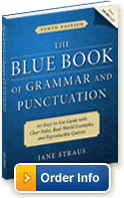|
Welcome to your GrammarBook.com E-Newsletter.

|
"I love using the GrammarBook.com E-Newsletter for my translation classes and I encourage my students to receive it, too."
— Geraldine P.
"As a teacher in an academy, I find the information in your newsletter invaluable."
— Joyce
"Because of you I now love learning English grammar."
— Rahim
|
|
|
Words Can Be Bullies
Words that start with the letter h don’t always act like it.
Consider “herb,” when it means “an aromatic plant used for seasoning in cooking.” Americans dump the h, whereas many Brits pronounce it. So we say “an ’erb,” but an Englishman says “a herb.”
A different sort of h-confusion happens when self-important speakers and writers say “an historic occasion” or “an heroic soldier.” Ever notice that “an” only precedes a few highfalutin h-words like “historic(al),” “hypothetical,” “hallucinogenic”? And they tend to have three or more syllables: “An heroic soldier” is also “a hero.”
About 20 years ago, Time magazine ran a front-cover headline beginning, “A Historic…” and misguided word nerds raised a furor, insisting Time should have said “An Historic”—but the magazine never budged, stating flatly that “an historic” is wrong.
In everyday conversation, would you describe a wailing brat as “an hysterical child”? If not, what makes “hysterical” so different from “historical”?
A Google check yields tips from various websites, which only reinforce common sense: “You should use ‘an’ before a word beginning with an ‘H’ only if the ‘H’ is not pronounced” (from the website wsu.edu/~brians/errors/anhistoric.html).
Or this: “you use an before vowel sounds…Following this rule, we would say ‘a historic,’ not ‘an historic’ ” (betterwritingskills.com).
Or this one, which ought to seal the deal: “I’d love to hear a reasonable argument, based on logic and not convention, in support of ‘an historic’…given the prevalence of such similar constructions as ‘a hotel downtown’ and ‘a high bar’ and ‘a hitman killed my
dog’ ” (ask.metafilter.com).
Those who say “an historic” are flirting with pomposity, and pomposity often leads to tortured language. I remember lawyer-turned-sportscaster Howard Cosell, rest his troubled soul, and the way he regularly subjected professional athletes to his cruel and unusual polysyllabic punishment. In general, jocks are spoiled, semi-educated boors, and they know it, so the tug-of-war between them and Cosell was great theater.
At its most sublime, it involved boxing champion Muhammad Ali. He and Howard made a great team, and there was genuine love and trust there. Whatever his faults, Cosell, perhaps at the risk of his own career, had taken up for the draft-evading Ali when the champ was something of a national pariah. (YouTube.com has many wonderful sequences of these two through the years.)
Although there was a good Cosell, all too often we got Bad Howard, neurotically insecure, the one who knew he was kept at arm’s length by these great physical geniuses—and resented it. He knew they mocked him, not caring that Cosell had more knowledge of more subjects than all of them put together. So he would sometimes do perverse things, like the time he bullied a rookie football player from some Deep South ghetto. Bad Howard said something like: “So, my young friend, in your estimation, did the immensity of the task assigned you, juxtaposed with the metaphysical certainty of your callow demeanor, effectuate a lessened or heightened capacity on your part?”
I’m not kidding. That’s pretty close to what Howard said. As the kid listened, his eyes widened with terror and confusion, as if he were being swarmed by a raging horde of ruthless linebackers. I don’t recall his answer.
This grammar tip was contributed by veteran copy editor and word nerd Tom Stern.
Due to the E-Newsletter's large readership, please submit your English usage questions through GrammarBook.com's "Grammar Blog." |
|
Pop Quiz
As we discussed last time, the great writer Elmore Leonard, who died August 20, deplored adverbs. Experienced writers like Leonard prefer strong nouns and verbs. In this quiz, try rewriting each sentence with greater precision and economy. There are no correct answers, but our suggestions may be found in the Answers section.
1. Avoiding wordiness is basically a simple principle of good writing.
2. He went into the room quickly.
3. She was incredibly thrilled by the experience.
4. He said things about us that were viciously harmful and insulting.
5. The committee strongly expressed disapproval of them.
Free BONUS Quiz For You!
[[firstname]], because you are a subscriber to the newsletter, you get access to one of the Subscription Members-Only Quizzes. Click here to take a Problems with Prepositions Quiz and get your scores and explanations instantly!
Teachers: We Need Your Help
This request is to all you teachers who use The Blue Book of Grammar and Punctuation in your classes. We are pleased to let you be the first to know that the newly revised, expanded, and reimagined eleventh edition of The Blue Book will be released in February 2014! The publisher would like to include short endorsements of the book, written by classroom teachers, on the back cover. Please submit your endorsement, which needs to be just a sentence or two, to info@grammarbook.com by September 4, 2013. For the endorsements that are selected, in addition to your name appearing with your endorsement, we will send you a complimentary hard copy of the eleventh edition. Simple guidance for writing an endorsement can be found here. Thank you!

"So convenient...hundreds of quizzes in one click."
[[firstname]], Subscribe to receive hundreds of English usage quizzes not found anywhere else!
- Take the quizzes online or download and copy them.
- Get scored instantly.
- Find explanations for every quiz answer.
- Reproduce the quizzes to your heart's content.
- EASY to use.
- No software to download.
- No setup time.
- A real person to help you if you have any questions!
"Fun to test my skills!" "The explanations really help...thanks!"
Your choice: Subscribe at the $29.95 or $99.95 level ($30 off - regularly $129.95).
"I download the quizzes for my students who don't have computer access."
Subscribe today to receive hundreds of English usage quizzes not found anywhere else!
"Makes learning English FUN!"
 |
Don't need all the quizzes at once?
You can now purchase the same quizzes individually for ONLY 99¢ each. Purchase yours here. |

Get Yours Today!
Get Amazon’s #1 Bestseller in Four Categories!
#1 in Grammar
#1 in Reading
#1 in Lesson Planning
#1 in Vocabulary |
The Blue Book of Grammar
and Punctuation by Jane Straus
An indispensable tool for busy professionals, teachers, students, homeschool families, editors, writers, and proofreaders.
Now available in print AND as an e-Book! Over 2000 copies are purchased every month!
Order Your Copy Today!
- Hundreds of Grammar, Punctuation, Capitalization, and Usage Rules
- Real-World Examples
- Spelling / Vocabulary / Confusing Words
- Quizzes with Answers
|
View the entire contents online
Discounts available for schools, bookstores, and multiple copies. Order Today!
 Wordplay Wordplay
These are reported to be quotes from Lawrence "Yogi" Berra, baseball Hall of Fame catcher who played for the New York Yankees for nineteen years.
"Always go to other people's funerals, otherwise they won't come to yours."
"Never answer anonymous letters."
On being the guest of honor at an awards banquet: "Thank you for making this day necessary."
Pop Quiz Answers
There are no "right" answers. These are suggestions.
1. Avoiding wordiness is a fundamental of good writing.
2. He hurried into the room.
3. The experience elated her.
4. He vilified us.
5. The committee censured them.
Learn all about who and whom, affect and effect, subjects and verbs, adjectives and adverbs, commas, semicolons, quotation marks, and much more by just sitting back and enjoying these easy-to-follow lessons. Tell your colleagues (and boss), children, teachers, and friends. Click here to watch. |





 Wordplay
Wordplay
